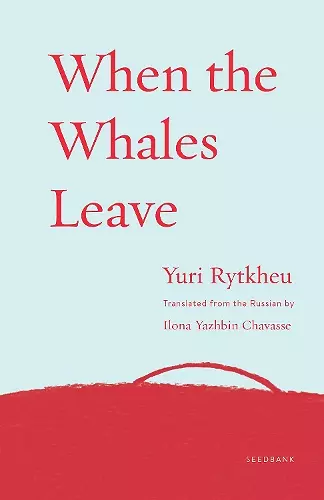When the Whales Leave
Yuri Rytkheu author Ilona Yazhbin Chavasse translator
Format:Paperback
Publisher:Milkweed Editions
Published:23rd Apr '20
Should be back in stock very soon

Galley quantities available for fiction media, translation media, select booksellers, and sales force by request Advertising and promotional collaboration with ALTA (American Literary Translators Association) Newsletter promotion via the publisher to fiction and translation lists of more than 20,000 contacts Excerpt placement in Lit Hub to celebration National Translation Month (September) Promotional push in conjunction with publisher's Seedbank series of world literature
“[Yuri Rytkheu’s] deep emotional attachment to this landscape of ice (today melting away under global warming forces) makes every sentence seem a poetic revelation.” —ANNIE PROULXNau cannot remember a time when she was not one with the world around her: with the fast breeze, the green grass, the high clouds, and the endless blue sky above the Shingled Spit. But her greatest joy is to visit the sea, where whales gather every morning to gaily spout rainbows. Then, one day, she finds a man in the mist where a whale should be: Reu, who has taken human form out of his Great Love for her. Together these first humans become parents to two whales, and then to mankind. Even after Reu dies, Nau continues on, sharing her story of brotherhood between the two species. But as these origins grow more distant, the old woman’s tales are subsumed into myth—and her descendants turn increasingly bent on parading their dominance over the natural world. Buoyantly translated into English for the first time by Ilona Yazhbin Chavasse, this new entry in the Seedbank series is at once a vibrant retelling of the origin story of the Chukchi, a timely parable about the destructive power of human ego—and another unforgettable work of fiction from Yuri Rytkheu, “arguably the foremost writer to emerge from the minority peoples of Russia’s far north” (New York Review of Books).
Praise for When the Whales Leave
"Milkweed's Seedbank series is one of the most exciting and visionary projects in contemporary publishing. Taking the long view, these volumes run parallel to the much-hyped books of the moment to demonstrate the possibility and hope inherent in all great literature." —Stephen Sparks, Point Reyes Books
"This worthy fable offers profound considerations about stewardship of and people's relationships to the natural world." —Publishers Weekly
“We have so little intimate information about these Arctic people, and the writer’s deep emotional attachment to this landscape of ice (today melting away under global warming forces) makes every sentence seem a poetic revelation.”—Annie Proulx
"When the Whales Leave is a gorgeous meditation on the magic of the natural world and why we need to preserve it." —BuzzFeed, "13 Must-Read Fantasy Books"
"Yuri Rytkheu comes from a Uelen Settlement of the Chukotsk National Territory in Siberia and carries with his work the voice of that vast and majestic landscape . . . It's sometimes hard to tell a fable from a fact these days, but in this case the fable states truths we shouldn't ignore, like where we descend from and the legacies we leave behind." —Literary Hub
"The first time I read Ilona Yazhbin Chavasse's translation, from the Russian, of Chukchi author Yuri Rytkheu's When the Whales Leave, it was like falling into a trance. Its language induces a type of hypnosis that compels the reader to read straight through to the end." —Marina Manoukian, Los Angeles Review of Books
"When the Whales Leave has an epic sensibility, but is also saturated in Arctic detail; the rendering of ice, snow, wind, and water are particularly poetic. English readers are in Chavasse's debt for bringing Rytkheu's world into ours: a slender novel with a wide message, imploring we cease imagining ourselves masters before all our seas become 'bereft of any sign of life.'" —Orion Magazine
"When the Whales Leave is predominantly a legend about how we see the world; it aims to life a veil and show that spirituality is ever-present, although, admittedly, increasingly difficult to notice . . . Rytkheu invites readers to return to a place of open-mindedness and open-heartedness and see that love, hop and humanity is all around us—exactly where we left it, generations upon generations ago." —Colorado Review
“When the Whales Leave is a mythological manifesto.”—Nicole Yurcaba, Sage Cigarette Magazine —Nancy Lord, former Alaska writer laureate, Anchorage Daily News
"[When the Whales Leave] is an intimate family saga, a fantastical tale of transformations amidst a shifting landscape, and a haunting tale about the divide (or lack thereof) between humanity and the natural world. Everything clicks into place neatly, and the result is a captivating blend of the mythic and the quotidian." —Words Without Borders
"When the Whales Leave is a story of Great Love come and gone. What we will create in its stead remains to be written." —Full Stop
“Arguably the foremost writer to emerge from the minority peoples of Russia’s far north.”—New York Review of Books
“Rytkheu immerses his readers in the fantastical landscapes of the Arctic circle, and does so without breaking a sweat. . . . His elegant, unforced descriptive writing can whip us across leagues of tundra and thread the jagged icebergs studding hyperborean seas, but when the blizzards hit and the characters are trapped in their huts, we’re snowbound there with them under the whale-oil lamp, chewing walrus and hoping for respite.”—Bookslut
“When the Whales Leave is a mythological manifesto.”—Nicole Yurcaba, Sage Cigarette Magazine
“Thousands of books have been written about the Arctic aborigines by intruders from the south. Rytkheu has turned the skin inside out and written about the way the Arctic people view outsiders. A Chukchi himself, [he] writes with passion, strength, and beauty of a world we others have never understood.”—Farley Mowat
ISBN: 9781571311313
Dimensions: unknown
Weight: unknown
144 pages